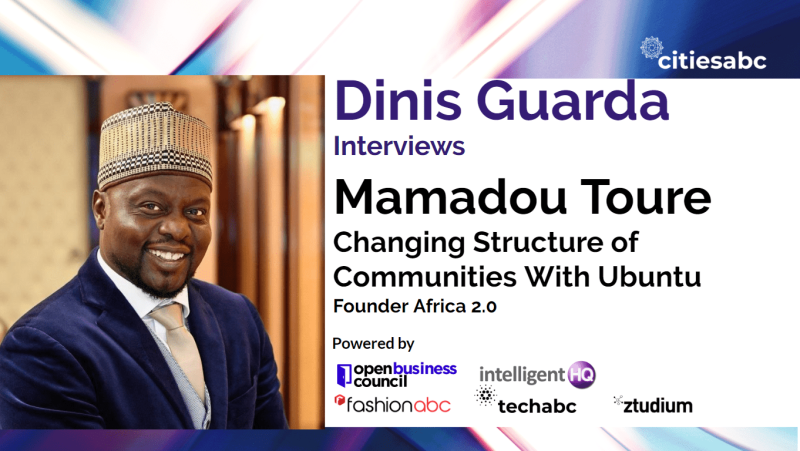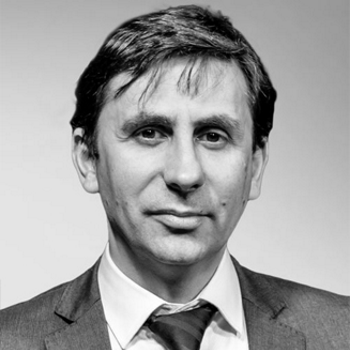Interview with Mamadou Toure, Founder Africa 2.0 And Ubuntu Capital - Changing Structure of Communities with Ubuntu And co-creation Tech

Categories :
Interview with Mamadou Toure, Founder Africa 2.0 And Ubuntu Group about the challenges facing Africa, digital transformation and how it can help changing structure of communities with Ubuntu.
Mamadou Toure Introduction
Mamadou Toure was born and raised in Cameroon. His school had over 100 students per class. From that humble background he became one of the world leaders changing Africa and pushing a genuine focus on the very African concept of Ubuntu: “I am because we are.” An idea that can be seen in all his projects of social, economic and financial empowerment and impact. He understood from the beginning the importance of leadership, structure change, technology as a tool to change and impact and build social balance. His leadership has been shaping Africa and the young leaders with Africa 2.0 and many other projects. Mamadou has been working with the World Bank and his experience reinforced the importance of co-creation balance with technology and leadership.
Interview questions focus
1. An introduction from you - background, overview, education...
2. Career and Vision
3. Your company and focus
4. About Africa 2.0 foundation
5. Vision behind Ubuntu: Goals and focus
6. Covid-19: how can you look at this as a way to redesign our society
7. Future vision
Mamadou Toure Quotes
How Mamadou became Mamadou
· A defining moment was in high school when the principal asked my parents and told them that I needed to change school. I changed to a top school and was surrounded by bright minds and that shaped my profile.
· It was very interesting to have this opportunity and was so impressive with the level of development and said to my mother that one day I would be going to Africa and work in development.
· I created my first non profit organisation when I was 19 and after I was admitted at the French Grande Ecole
· I believe that the real gap in Africa and the rest of the world lies in leadership. That is something I have been trying to fix and improve my whole life.
· I built the first platform for Diaspora to go to Africa and manage the challenges of business school and grew the network to 200 students. During that time we built libraries in Africa and did many social and community driven activities.
· After that I started pushing e-commerce in Africa as a way to support entrepreneurs and for Africa to embrace this new world.
· Started working with KPMG on banking structure work that became handy when I came to blockchain two decades later.
· When I joined multiple NGOs I started understanding the challenges Africa was facing and decided to focus on structural impact to help communities. My work since that moment has been shaped by that, even my education. I did a Major and a MA in finance to help me accomplish that vision and focus on having an impact through investment and the finance services.
· It was a time when Africa was not on the map and I spent time travelling and speaking with investors to invest in Africa and we reached the World Bank. We got them to invest in social projects while nurturing a collaboration between us.
· My mother told me that: Your child dream of changing Africa is happening and went to South Africa and at the time decided to focus on telecoms and technologies.
· This was on my focus on how to get people to get a better opportunity and technology telecom, media was that equaliser.
What are the problems of the continent and how to unlock them: Africa 2.0 and Ubuntu Group
· The most pressing issues: we need a vision for tackling our challenges and fully unlock the potential of the African Continent.
· Africa is awakening and companies all around the world are starting to realize the potential that lies in the continent. Only in 2050 we will have a planet with 2 billion plus Africans and if you need Data you will go to Africa.
· Digital transformation is happening in Africa and there are more and more initiatives to bring emerging technologies such AI, FinTech and blockchain. As I see blockchain right now, it can disrupt economies through decentralised networks that are immutable and give equal opportunities to compete.
· The question we faced then was: How do we get 55 countries and young leaders and entrepreneurs to go towards this direction?
· We are experiencing a new generation of open source software and technologies and we have a lot of people working in a lot of projects that are contributing to this new world of blockchain and open source era in a decentralized collective response and alliances of like minded people sharing some ideas.
· We have 2 ways to unite people: common enemy or common vision, but ideally we bet for a third way - common dream.
· The power of frequency - the power vibration of human emotions
· Entrepreneurs are the ones that will change the world. But we need to use the power of decentralised finance and digital crowd funding that are tools to power ideas. The only difference between businesses that succeed are the ones that empower people's lives.
· All of these ideas converged in a new project. We understood that we need a think tank and that vision became Africa 2.0 Foundation.
· So we wrote a manifesto and presented it to the African Union. It was titled A Vision for Africa, Transform Hope into Action to uplift Africans and transform its infrastructure. The African Union proposed Agenda 2063, a long term Panafrican vision for the continent with key sections very much aligned with the Africa 2.0 Manifesto.
· Importance of Ubuntu - the collective is key for the individual.
· The manifesto is based in a social contract between different stakeholders
· Every person can be identified by:
what we believe,
what we do - actions,
our emotions,
our network, family, colleagues friends, tribe
· From Africa 2.0 we prepared a report about Covid-19 and how to push things forward by different people from multiple backgrounds that provide solutions
· The Ubuntu Love Challenge Initiative - “Ubuntu global declaration of our interdependence.” It reminds people that if we give into the fear we will get into hopelessness. That shows the importance of interconnectedness and the need to be prepared, only then we have more chances to change and overcome the issues.
· The Ubuntu Tribe came from this idea of changing the mismatch of the African issues. Some of the ideas: what if we make the resources an asset, a trading element
· In history, crises always created new opportunities for changing and with inspiration of Ubuntu by people like Nelson Mandela. The world needs these values of what keeps us together.
· The Ubuntu concept. An anthropologist proposed a game to the kids in an African tribe. He put a basket full of fruit near a tree and told them that whoever got there first won the sweet fruits. When he gave them the signal to run they all took each other’s hands and ran together, then sat in a circle enjoying their treats. When he asked them why they chose to run as a group when they could have had more fruit individually, one child spoke up and said: “UBUNTU, how can one of us be happy if all the other ones are sad?”. “Ubuntu” in the African Language means; “I am because we are”.
· The platform is build for the tech point of view with blockchain technology and we have partners and gold base with contracts and in 6 months will have 500 million gold supply that will allow to have a solution with distribution wealth though sustainable gold supply chain, and focus on solutions that create new solutions to create impact and difference.
· We are doing a STO project and talking with investors and have a product ready to go.
· Coordination of multiple projects - lateral thinking providing different pieces of the puzzle.
· Decentralised investments in five elements: air (telecoms and tech), water, fire, earth, love.
Mamadou Toure Biography
Inspired by the wisdom of his ancestors, Mamadou Kwidjim Toure believes that co-creating a better world is possible when diversity is nurtured and access to opportunities is evenly distributed. This philosophy was the driving force behind establishing Africa 2.0, a non-for-profit pan African civil society organization with the aim to create a sustainable vision for the transformation of Africa.
Named one of the top 10 Most Influential Men in Africa by Forbes Magazine in 2014, Mamadou founded the Ubuntu Group in 2015 and built on his global network and investment savviness to launch socio-economic projects throughout the continent of Africa. His recent venture, Ubuntu Tribe, a platform promoting shared economy through digitization of gold and other mineral ressources as a means for financial inclusion and wealth redistribution received in 2019 a distinction as finalist at the African Bankers Awards. In 2020, he was listed among the top 30 most influential in the world in blockchain technology.
Over the past 20 years, Mamadou worked in instituons such as KPMG, BNP Paribas Investment Banking, IFC (World Bank Group) and finally General Electric as Managing Director in charge of Investments and Project Finance for Subsaharan Africa. He has worked on infrastructure, mining, agriculture technology projects exceeding a combined value of US$ 30 billion, thus creating opportunities and hope for many people in Africa. He has been at the forefront of international high finance and remains a strong proponent for digital economy as an engine for emancipation and shared wealth creation.
Mamadou is a global citizen, passionate of culture, art and avid reader of history books, he continues to advocate for a bright future for humanity through pushing the boundaries. He believes in the power of collective action to build lasting enlightenment and prosperity. Mamadou holds MSc in Finance and completed education programs at Harvard Kennedy School on « Public-Private Partnership » in 2010, and « Global Leadership and Public Policy for 21st Century » as World Economic Forum Young Global Leader in 2018.
About Africa 2.0
Africa 2.0 is a pan-African civil society organisation providing a platform for emerging and established African leaders to drive forward the transformation of Africa. Founded in 2010 around the belief that with a unifying vision and a focused “coalition of the willing”, Africans can accelerate the development of their continent. "Our vision and goals are set out in our Manifesto". This guiding document was written by African thought leaders and experts, and sets out sustainable and thoughtful solutions to Africa’s challenges that will result in lasting change
The Ubuntu Love Challenge Initiative
At its core, The #UbuntuLoveChallenge platform is a digital home for universal love. Change-makers and experts around the world will fill the online hub with projects, initiatives and knowledge of love and hope, and it will serve as a powerful totem of humanity in the face of hardship.
In the wake of this worldwide crisis, we are inviting people to reclaim the fear and chaos they feel and channel pain into powerful acts of love.
Join millions of people around the world to make history as The #UbuntuLoveChallenge platform will be filled with projects, initiatives, and knowledge that can be shared to encourage a civilian peer to peer collaboration that addresses current problems and designs solutions for the future.
The Ubuntu Tribe
The Ubuntu Tribe means the human tribe. An environment based in digital assets and trading as an asset. The whole focus is about uniting. We are looking into building a platform and co-create a platform together. We have the tools and the idea is to use it, rethinking and changing. What if people can pay with digital assets and digital gold.
Utribe. Available any place in the world; tokens key products that will come of this project: gold backed and tokenised security.
About Ubuntu Capital Group
Ubuntu Capital Group strives to provide an expansive range of banking services to a multitude of diverse corporations, financial institutions, investment funds and governmental projects. The range of services include: strategic advisory assignments that operate with respect to mergers, acquisitions, divestitures, capital-raising, corporate defence activities, restructuring, spin offs, risk management debt and equity. Our level or expertise also includes local and cross-border transactions as well as derivative transactions that directly relate to the fore mentioned activities.
Ubuntu Capital’s Leadership Team has amassed a solid track record as a trusted leader, advisor and financier to the company’s various clients. The clients range from financial institutions, financial sponsors, government, public authorities, board directors and special committees.
Ubuntu Capital constantly strives to provide the best-in-class advice and patterns on execution excellence for most complex and ornate transactions across products in order to help clients grow.
Ubuntu Capital remains committed to the strategy of co-investing with clients and is focused on maintaining its status as a significant financier and provider of capital raising services. This in turn enables our clients to achieve their strategic goals.
Africa is currently in a complex environment that has a myriad number of emerging markets. It has become apparent that investment is no longer a sustainable and viable solution if it is not combined with tailor-made risk mitigation tools that are associated with adequate partners and synergies to help optimize returns while limiting downsize for investors and stakeholders.
With 20 years of experience in Africa, closing deals in 26 countries. Ubuntu Capitals’s team has used its experience to propose Financial Engineering Solutions that are adapted to the clients, partners and investors needs to ensure a win-win scenario to secure sustainable and substantial returns for shareholders and stakeholders.
Ubuntu Capital also provides advisory services and co-investment opportunities to create synergies between local and international partners. These synergies are based on value added reviews of financial capabilities, local industry expertise, culture alignment and market reputation. With 20 years in investment and consortium engineering in Africa, we have worked with corporates and investors from around the world. The aim is to pivot this knowledge of local and global landscapes in our dealings as our experience in the field has taught us invaluable lessons and skills.
Optimization of Social and Financial Returns
Statistics indicate the initiatives of high financial returns in emerging markets particularly Africa are mostly likely prone to consider a social return. Ubuntu Capital is working with a number of leading global and regional firms jointly as a project investment advisor and co-investor in the Project Ecosystem. By designing tailor-made blended finance solutions which combine commercial financing, development funding, impact investing, philanthropy funding and corporate CSR, Ubuntu Capital has been able to vastly enhance project ecosystems.
Ubuntu has modelled a unique set of skills and expertise that go beyond building sustainable investment projects but actually helps clients build sustainable ecosystems around the company and its projects.
Ubuntu Capital has combined a mix of advisory and co-investment strategies around new approaches and concepts that promote “Equitable Investment”. Equitable Investment is where funds are not just deployed to maximize a project’s financial returns but they are rather deployed around the project’s ecosystem. This in turn helps to multiply sources of return, which will maximize social return in the instance of investment and capacity building that is purposely built to strengthen a local supply chain, consumer value chain or community empowerment through entrepreneurship promotion. It extends to partner mobilization for investment in commercially viable, basic community infrastructure and health services.
The famous adage says that “It takes a village to raise a child” the same could be said that in Africa it takes a village to grow and sustain a business, the only difference being that the village is actually an ecosystem.
Sources / links:
https://live.worldbank.org/experts/mamadou-kwidjim-toure
https://fr.wikipedia.org/wiki/Mamadou_Tour%C3%A9_(homme_politique)
https://www.weforum.org/people/mamadou-toure
http://www.africanleadershipacademy.org/staffulty/speakers/mamadou-kwidjim-toure

Dinis Guarda is the founder and chief vision architect for citiesabc.com and CEOCreatorAuthor of freedomxcom. He has before created the platforms openbusinesscouncil.org, fashionabc.org, intelligenthq.com, hedgethink.com, tradersdna.com and and IP technologies blocksdna.com, lifesdna.com, iDNA and indexDNA.
With 20+ years experience in international business and digital transformation Dinis Guarda has been a Lecturer and guest Speaker in international business schools such as: Cambridge, Kings College, Copenhagen Business School, INSEEC, Monaco University among others. Dinis is the author of various books. His upcoming book, titled 4IR Magna Carta Cities ABC: A tech AI blockchain 4IR Smart Cities Data Research Charter of Liberties for our humanity is due to be published in 2020. Before that, he has published “4IR AI Blockchain Fintech IoT Reinventing a Nation“, “How Businesses and Governments can Prosper with Fintech, Blockchain and AI?”, also “Blockchain, AI and Crypto Economics – The Next Tsunami?” among others. He was responsbile for over 20 books/ebooks/magazines published in various languages.
Dinis is a serial entrepreneur and CEO / chairman of the companies ztudium / techabc / open business platform. Dinis is involved as a strategist, board member and advisor with the payments, lifestyle, blockchain reward community app Glance technologies, for whom he built the blockchain messaging / payment / loyalty software Blockimpact, the seminal Hyperloop Transportations project, Kora, and blockchain cybersecurity Privus.
He is listed in various global fintech, blockchain, AI, social media industry top lists as an influencer in position top 10/20 within 100 rankings: such as Top People In Blockchain | Cointelegraph and https://cryptoweekly.co/100/ .
Between 2014 and 2015 he was involved in creating a fabbanking.com a digital bank between Asia and Africa as Chief Commercial Officer and Marketing Officer responsible for all legal, tech and business development. Between 2009 and 2010 he was the founder of one of the world first fintech, social trading platforms tradingfloor.com for Saxo Bank. More about him here https://www.openbusinesscouncil.org/wiki/dinis-guarda/









